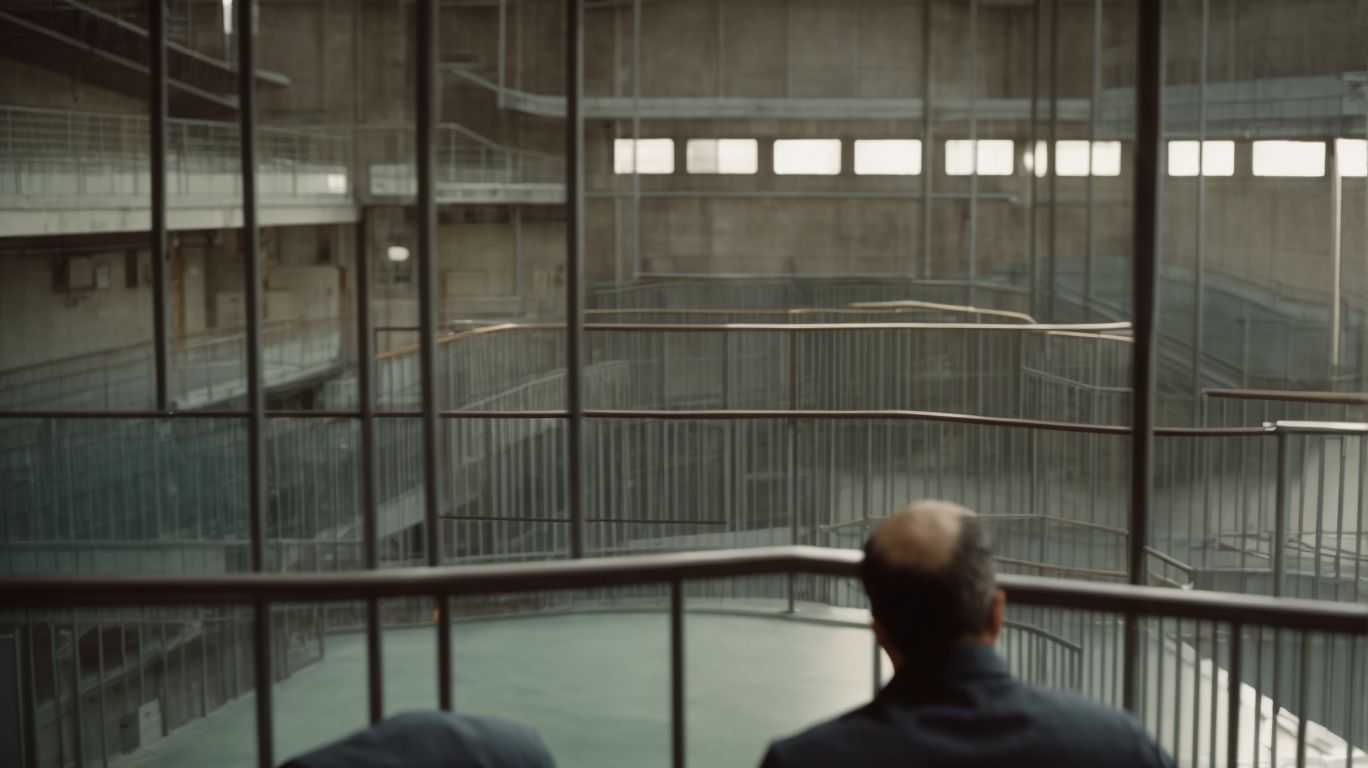Correctional psychology is a specialized field that addresses the mental health needs of individuals within the criminal justice system. In this article, we will explore the role of correctional psychologists and their main goals.
These goals include assessing and treating mental health issues, promoting positive behavior change, and reducing recidivism rates. We will also discuss the different types of correctional facilities, common mental health issues, ethical considerations, and the challenges faced by correctional psychologists.
Join us as we delve into the fascinating world of correctional psychology and its future.
Contents
- 1 Key Takeaways:
- 2 What is Correctional Psychology?
- 3 What is the Role of a Correctional Psychologist?
- 4 What are the Main Goals of Correctional Psychology?
- 5 What are the Different Types of Correctional Facilities?
- 6 What are the Common Mental Health Issues in Correctional Settings?
- 7 How is Mental Health Treatment Provided in Correctional Settings?
- 8 What are the Ethical Considerations in Correctional Psychology?
- 9 What are the Challenges Faced by Correctional Psychologists?
- 10 What is the Future of Correctional Psychology?
- 11 Frequently Asked Questions
- 11.1 What is correctional psychology?
- 11.2 What are the main goals of correctional psychology?
- 11.3 What are the key responsibilities of a correctional psychologist?
- 11.4 How does correctional psychology differ from other branches of psychology?
- 11.5 What are the challenges faced by correctional psychologists?
- 11.6 What are some interventions used in correctional psychology?
Key Takeaways:
- Correctional psychology focuses on assessing and treating mental health issues, promoting positive behavior change, and reducing recidivism rates within the correctional system.
- Correctional psychologists play a crucial role in providing mental health treatment in various correctional facilities such as jails, prisons, and juvenile detention centers.
- Common mental health issues in correctional settings include substance abuse disorders, antisocial personality disorder, and depression and anxiety.
What is Correctional Psychology?
Correctional psychology is a specialized field that applies principles of psychology within the correctional system to address the mental health and behavioral aspects of offenders and inmates.
This field plays a crucial role in assessing and treating offenders to promote their rehabilitation and successful reintegration into society.
Psychological evaluations are utilized to understand the underlying causes of criminal behavior, enabling tailored intervention strategies.
Correctional psychologists provide counseling, therapy, and support to address various issues such as substance abuse, anger management, and trauma.
By leveraging evidence-based practices, they strive to foster positive behavioral changes and enhance the overall well-being of individuals within the correctional system.
What is the Role of a Correctional Psychologist?
A correctional psychologist plays a crucial role in assessing, diagnosing, and treating the mental health issues of incarcerated individuals, while also contributing to their rehabilitation and successful reintegration into society.
Correctional psychologists work within correctional facilities to conduct mental health assessments, develop treatment plans, and provide therapy to address the unique challenges faced by the prison population.
They collaborate with correctional staff to monitor and address the mental well-being of inmates, often working with individuals struggling with substance abuse, trauma, or severe mental illnesses.
These professionals play a key role in designing and implementing rehabilitation programs aimed at reducing recidivism and preparing inmates for their eventual release. They may offer group therapy, anger management sessions, or cognitive-behavioral interventions to cultivate essential life skills and promote positive behavior changes.
Correctional psychologists conduct forensic assessments to evaluate an individual’s mental state, competency to stand trial, and potential risk for violence. By providing expert testimony in legal proceedings, they contribute to the fair and just treatment of individuals within the criminal justice system.
What are the Main Goals of Correctional Psychology?
The primary goals of correctional psychology revolve around facilitating the rehabilitation, treatment, and successful reintegration of offenders, ultimately contributing to public safety and reducing recidivism rates.
Correctional psychologists work towards identifying and addressing the underlying behavioral and mental health issues that may have contributed to the individual’s criminal behavior.
Through various therapeutic interventions and evidence-based practices, they aim to enable offenders with the necessary skills and coping strategies to lead law-abiding lives upon their release.
By targeting the root causes of criminal behavior and providing effective treatment, correctional psychology not only benefits the individual but also plays a crucial role in enhancing public safety and reducing the likelihood of reoffending.
Assessing and Treating Mental Health Issues
One of the key aspects of correctional psychology involves the assessment and treatment of various mental health issues prevalent among the inmate population, integrating principles from psychological science and forensic psychology.
Within correctional settings, the diagnostic processes are multifaceted, often requiring a thorough evaluation of the individual’s history, behavior, and mental state.
This may involve psychological assessments, interviews, and collaboration with medical professionals to determine the presence of disorders such as depression, anxiety, bipolar disorder, schizophrenia, and substance use disorders.
Therapeutic interventions for these mental health challenges aim to address the unique contextual factors of incarceration, often utilizing cognitive-behavioral therapy, group therapy, and psychosocial rehabilitation.
The provision of psychiatric medications, when indicated, is closely monitored within the structured environment of correctional facilities to ensure efficacy and safety.
Promoting Positive Behavior Change
Another critical goal of correctional psychology is to promote positive behavior change among offenders through the implementation of rehabilitation programs, effective supervision, and community sentences.
Rehabilitation programs are designed to address the root causes of criminal behavior and help individuals develop the skills and mindset necessary to lead law-abiding lives upon release. These programs may include education, vocational training, substance abuse treatment, and mental health counseling.
Effective supervision involves closely monitoring the behavior and progress of offenders, providing support and guidance where needed, and holding them accountable for their actions. This approach aims to reduce the likelihood of recidivism and promote a successful reintegration into society.
Community sentences, such as probation and parole, allow offenders to serve their sentences while remaining in the community under certain conditions. This fosters a sense of responsibility and encourages individuals to make positive contributions to society while under supervision.
Reducing Recidivism Rates
One of the overarching goals of correctional psychology is to reduce recidivism rates within the correctional system, particularly in Canadian prisons and federal penitentiaries, through targeted interventions and support mechanisms.
These strategies involve a combination of psychological, educational, and vocational programs to address the needs of inmates and prepare them for successful reintegration into society post-release.
In Canadian prisons and federal penitentiaries, the focus is on implementing culturally sensitive interventions that consider indigenous traditions and beliefs to better serve the diverse inmate population.
The establishment of halfway houses and community-based reentry programs aims to provide ongoing support and supervision for individuals transitioning from incarceration to community living, thereby reducing the likelihood of reoffending.
What are the Different Types of Correctional Facilities?
Correctional facilities encompass a diverse range of institutions, including jails, prisons, and juvenile detention centers, each serving distinct purposes within the legal and psychological frameworks of the correctional system.
Jails primarily hold individuals awaiting trial or serving short sentences, while prisons accommodate long-term confinement for those convicted of serious offenses.
Juvenile detention centers, on the other hand, cater to underage offenders and focus on rehabilitation and education. These facilities play critical roles in maintaining public safety, administering justice, and providing opportunities for rehabilitation and reintegration into society.
They also interface with various professionals such as correctional officers, psychologists, social workers, and legal experts to address the multifaceted needs of the incarcerated population.
Jails
Jails serve as short-term confinement facilities for individuals awaiting trial or serving shorter sentences, accommodating a diverse inmate population with varying mental health profiles and behavioral challenges.
Within this environment, the inmate population includes individuals with different backgrounds and legal circumstances, creating a complex social dynamic.
The prevalence of mental health issues among inmates has prompted a growing awareness of the need for specialized mental health care within correctional settings.
Forensic psychologists play a crucial role in evaluating and addressing the mental health considerations of inmates, providing assessments, therapy, and support to promote rehabilitation and mitigate the risk of recidivism.
Their expertise is instrumental in shaping intervention strategies and helping inmates navigate the challenges they face during their confinement.
Prisons
Prisons function as long-term correctional institutions housing individuals serving extended sentences, with a focus on rehabilitation programs, parole considerations, and addressing mental health challenges within the correctional facility.
These institutions play a crucial role in not only confining offenders but also in providing opportunities for their rehabilitation and reintegration into society.
Along with standard incarceration, prisons offer various programs such as vocational training, education, and counseling to help inmates acquire skills and address behavioral issues.
The evaluation of parole eligibility and preparations for reentry are integral components of the prison system. The process involves assessing an individual’s behavior, participation in treatment programs, and their potential to become law-abiding citizens upon release.
Addressing mental health challenges within correctional facilities is another vital aspect. Prisons strive to identify and treat mental health issues among inmates through counseling, therapy, and medication, thereby aiming to reduce recidivism rates and promote overall well-being.
Juvenile Detention Centers
Juvenile detention centers cater to youth offenders and provide a structured environment for rehabilitation, integrating community sentences and dedicated programs to address the mental health needs of young individuals within the correctional system.
In these facilities, rehabilitation initiatives are tailored to the unique needs of adolescent offenders. The focus is on education, skill development, and counseling to promote their successful reintegration into society.
The programs in juvenile detention centers often involve vocational training, behavioral therapy, and constructive activities. These aim to divert them from criminal activities and support their mental health.
Professional therapists and counselors are available to provide individual and group therapy sessions, addressing trauma, behavioral disorders, and any underlying mental health challenges that the young individuals may be facing.
What are the Common Mental Health Issues in Correctional Settings?
Correctional settings commonly present a range of mental health issues, including substance abuse disorders, antisocial personality disorder, depression, anxiety, and various other mental disorders that warrant specialized attention and treatment.
These mental health challenges within correctional settings significantly impact the well-being of inmates, often leading to high levels of stress, aggression, and difficulty in coping with the demands of incarceration.
The implications of untreated mental health disorders can manifest in heightened rates of self-harm, suicide attempts, and interpersonal conflicts, posing immense challenges for the staff and administration.
It is imperative to recognize that individuals with mental health disorders in correctional facilities require adapted therapeutic interventions and comprehensive support services, tailored to address the complex interplay between their legal circumstances and mental health needs.
Failure to provide adequate treatment can perpetuate a cycle of recidivism and exacerbate the existing challenges within the correctional system.
Substance Abuse Disorders
Substance abuse disorders, prevalent among offenders in correctional settings, necessitate targeted rehabilitation and treatment programs to address the complex interplay between addiction, mental health, and successful reintegration into society.
These disorders not only affect the individual’s behavior and cognitive function during incarceration, but they also have far-reaching consequences for their eventual release and re-entry into the community.
Without appropriate intervention and support, the cycle of substance abuse and criminal behavior can perpetuate, leading to a higher likelihood of recidivism and exacerbating the existing strain on the correctional system.
Antisocial personality disorder presents significant challenges within the correctional system, requiring specialized risk assessment, supervision, and interventions rooted in forensic psychology to address the behavioral complexities associated with the disorder.
Understanding the implications of antisocial personality disorder within correctional settings is crucial for creating effective management strategies. Individuals with this disorder often exhibit manipulative and aggressive behaviors, posing challenges to institutional safety and security.
Forensic psychology plays a vital role in developing comprehensive risk assessment protocols to identify potential patterns of non-compliance and recidivism.
The implementation of tailored supervision strategies, such as cognitive-behavioral interventions and structured social skills training, can assist in addressing the rehabilitative needs of incarcerated individuals with antisocial personality disorder.
Depression and Anxiety
Depression and anxiety are prevalent mental disorders within correctional facilities, necessitating the implementation of specialized rehabilitation programs and interventions led by forensic psychologists to address the unique mental health needs of affected individuals.
The challenging dynamics of correctional settings often exacerbate existing mental health conditions, making it essential to have tailored interventions to address these issues effectively.
Forensic psychologists play a crucial role in understanding the intricate relationship between criminal behavior and mental health, enabling them to develop targeted programs that provide support and therapy to individuals struggling with depression and anxiety.
These programs aim to alleviate symptoms, enhance coping skills, and minimize the risk of recidivism.
How is Mental Health Treatment Provided in Correctional Settings?
The provision of mental health treatment in correctional settings requires a comprehensive approach that considers ethical considerations, parole implications, and the ethical practice of forensic psychology to ensure the well-being and rehabilitation of inmates.
Addressing the mental health needs of incarcerated individuals involves a multifaceted approach that integrates therapeutic interventions, psychiatric assessments, and counseling services.
Ethical considerations encompass maintaining confidentiality, avoiding dual relationships, and promoting autonomy while adhering to the standards of professional conduct.
Parole implications necessitate the implementation of treatment programs aimed at reducing recidivism and facilitating successful reintegration into society.
This involves collaborating with correctional staff, parole officers, and community mental health providers to ensure continuity of care beyond the prison walls.
When practicing within correctional settings, forensic psychologists must navigate the delicate balance between safeguarding the rights of inmates and fulfilling their professional obligations.
Their ethical practice involves recognizing the power differentials inherent in the setting, ensuring informed consent, and safeguarding against coercion or exploitation.
What are the Ethical Considerations in Correctional Psychology?
Correctional psychology operates within a framework of ethical considerations that are crucial in ensuring the well-being of individuals in Canadian prisons and federal penitentiaries, while upholding the professional standards and responsibilities of correctional psychologists.
In correctional psychology, ethical considerations are crucial in guiding the assessment, treatment, and rehabilitation of incarcerated individuals. These principles help maintain a balance between promoting inmates’ psychological well-being and respecting their rights and dignity.
Ethical guidelines also provide a foundation for addressing the unique challenges and complexities of the correctional environment, such as power dynamics, confidentiality concerns, and dual loyalties.
What are the Challenges Faced by Correctional Psychologists?
Correctional psychologists encounter various challenges related to public safety, the complexities of rehabilitation, and the diverse mental health needs of the inmate population, underscoring the nuanced nature of their professional responsibilities within correctional facilities.
Addressing public safety involves not only managing potential security risks but also fostering an environment that promotes mental and emotional well-being.
The complexities of rehabilitation often intersect with the diverse mental health needs of the inmate population, creating a multifaceted landscape where individualized care and intervention strategies are paramount.
The interplay of these factors necessitates a comprehensive understanding of the psychological dynamics within correctional facilities and poses ongoing challenges for correctional psychologists.
What is the Future of Correctional Psychology?
The future of correctional psychology presents opportunities for enhanced interventions, the integration of forensic psychologists, and tailored support mechanisms for the evolving needs of federal provincial/territorial incarcerated offenders, shaping the landscape of rehabilitation and mental health within correctional facilities.
With an increasing focus on evidence-based practices, the role of forensic psychologists in correctional settings is gaining recognition. Their expertise in assessing and addressing the complex psychological dynamics of individuals involved in the criminal justice system contributes significantly to improving rehabilitation outcomes.
The evolving needs of federal provincial/territorial incarcerated offenders call for targeted interventions that consider factors such as trauma, substance abuse, and diverse cultural backgrounds. This demand emphasizes the importance of specialized support mechanisms designed to address the unique challenges these individuals face.
As correctional psychology continues to develop, there is a growing potential to enhance the overall well-being and successful reintegration of incarcerated individuals within the community, ultimately promoting a safer and more cohesive society.
Frequently Asked Questions
What is correctional psychology?
Correctional psychology is a specialized field of psychology that focuses on the assessment, diagnosis, treatment, and rehabilitation of individuals who are involved in the criminal justice system.
What are the main goals of correctional psychology?
The main goals of correctional psychology are to promote the psychological well-being of individuals in the criminal justice system, reduce the risk of reoffending, and facilitate successful reintegration into society.
What are the key responsibilities of a correctional psychologist?
Correctional psychologists are responsible for conducting psychological assessments, providing therapy and counseling, developing treatment plans, and collaborating with other criminal justice professionals to ensure the safety and well-being of individuals in the system.
How does correctional psychology differ from other branches of psychology?
Correctional psychology differs from other branches of psychology in that it focuses specifically on working with individuals in the criminal justice system, incorporating elements of both clinical and forensic psychology.
What are the challenges faced by correctional psychologists?
Correctional psychologists face a number of challenges, including working with a diverse population, managing complex mental health issues, navigating the criminal justice system, and addressing ethical concerns in a highly controlled environment.
What are some interventions used in correctional psychology?
Some common interventions used in correctional psychology include cognitive-behavioral therapy, anger management programs, substance abuse treatment, and vocational training to prepare individuals for successful reintegration into society.




